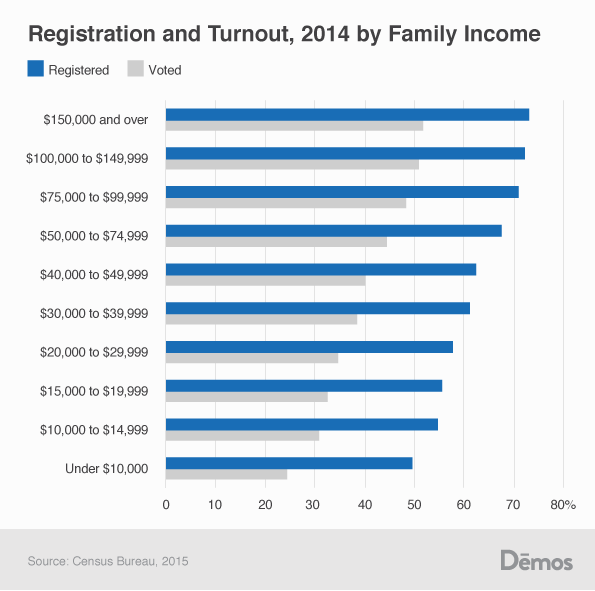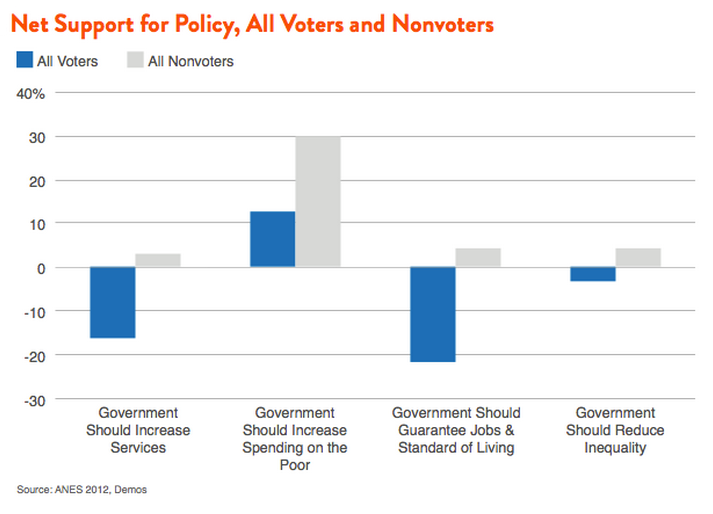One of the perennial puzzles that political observers in the US have struggled to understand is how it can be that a political party like the Republicans that is so nakedly supportive of the interests of the plutocracy manages to win so many elections. The Republicans consistently advance policies that are harmful to practically everyone except the very wealthy and yet they currently have majorities in the US Senate, House of Representatives, governorships, and state legislatures.
One explanation is that ordinary people have been bamboozled into thinking that the GRAGGS issue (guns, race, abortion, gays, god, and sex) are the most important even though all of them have barely any tangible effect on their everyday lives, unlike issues of income inequality, health care, education, social security, infrastructure, and social services.
No doubt this is a factor. But more recently a more nuanced analysis has emerged that says that in addition to those factors, the problem is not that people at the lower end of the economic spectrum vote for Republicans and thus against their own interests but that they tend to not vote at all in larger numbers, as this graphic by Ezra Klein suggests, leaving the upper income groups to disproportionately dominate elections.
Similarly, those who think that government should increase services and spending on the poor, and reduce inequality are the ones less likely to vote.
Why don’t the lower income groups vote? Part of the reason is that the Democrats in their neo-liberal phase have also sold lower-income people a bill of goods and made them disenchanted with the whole political process, leading to a level of cynicism that causes them to think that voting does not matter. Another part of the problem are the deliberate attempts to make registering to vote and actual voting harder so as to drive down turnout among lower income groups.
But there still remains the question becomes why the people who are in the middle and upper end of the income spectrum vote for a party that will harm the ones at the lower end and to a lesser extent even themselves. Here things get more tricky to understand. It seems like the idea of the lower income classes being moochers and looters, taking advantage of the hard work of others, has become entrenched. The people in the middle of the income spectrum see themselves as the real backbone of the country, producing the wealth. And they have been persuaded that those at the bottom are the real problem, not the ones at the top. As a result they see those who promise to take actions to reduce income inequality and improve the conditions of the poor not as a good form of redistribution that reduces the vast inequality between the obscenely wealthy and the rest of us but as a bad form of redistribution that will take from the middle class and give to the undeserving poor.
This ties in with two other ideas. One is that people tend to resent the perceived inequalities that they can see around them more than the abstract ones they merely hear about. The fact that the people at the top have millions and billons of dollars and live the high life while they have little may bother them somewhat but those people live completely separate lives in their gated communities and you never run across them in your daily life. But the idea that the teacher next door ‘gets the summer off’ while they have to work year round makes them more resentful. The same with the government sector worker down the street who can look forward to a pension when she retires while you have only your meager social security.
In addition, the fear that someone currently lower on the socio-economic scale may, as a result of redistributive policies, rise above them makes them more alarmed than the idea of reducing the income of those at the top, which would not change their social standing in the least.
All these drive people to vote their fear, envy, and resentment rather than their hopes and dreams. Bernie Sanders is a candidate who has abandoned the neo-liberal, Republican-lite platform that Democrats have been using for years but it will take a while for his message to catch on and be adopted by other Democrats at all levels.



The UK has a similar issue (accepting for the moment that in UK politics our “right wing” is arguably to the left of the Democrats). We have a Conservative government, after five years of disastrous centre-right coalition. How? (One reason is the genius way the right managed to pin the blame for basically everything onto the willing dupes of the centrist Liberal Democrats, who can for all intents and purposes be ignored as an electoral force in the UK for at least the next fifty years).
I spoke to a good friend of mine about voting. I have a good job and have always voted Labour and paid my taxes with a spring in my step and a song in my heart. My mate earns about half what I do, but has always voted Conservative. Why? Because, he tells me, that when Labour get in they “spend all the money”, and then the Conservatives have to come along and sort it all out. I tried to point out to him that the spend the money (*MY* money, I pay tax at a higher rate than him) on people like him, and that the Conservatives are taking all that away. Fundamentally, though, in the UK at least, the left has a credibility problem when it comes to the economy, a problem the right doesn’t have, despite being demonstrably no better (but perhaps only if you’re old enough to remember when Norman Lamont was chancellor -- google “Black Wednesday” if you don’t know what I’m on about).
Another reason I often hear for the tendency of the American poor to vote against their own interests is the much greater tendency of Americans to think that, to quote Del Boy Trotter, “this time next year we’ll be millionaires”.
Good question. I’ve seen dozens of explanations and most of them probably have some element of truth.
Besides what is listed above in the OP:
1. The demographic transition to US majority nonwhite in 2043 scares the whites silly. There is a lot of data on this. Romney voters were 88% white. The GOP is the party of racists and scared rich old white men.
2. The average GOP voter understands vaguely that the 1% has sold them down the river. The middle class is disappearing rapidly and has since 1970.
This explains Donald Trump!!! Trump proposes simple solutions to complex problems. Trump is an open racist. Trump is an outsider who will bash Fox NoNews and the GOP establishment almost as much as he will women or Hispanics. Polls show Trump taps into the rage of middle and working class whites from mostly the south who are struggling and failing any way.
It’s worth listening to a writer who has (and possibly still does) live in poverty. Linda Tirado, against incredible odds, got her book published about her life as a member of the working poor (“Hand to Mouth: Living in Bootstrap America”, an interesting read). Her opinion piece is here: Why the poor vote ‘against their own interests’. Read it for yourself, but I took away the short version that Democrats as a whole are not consistent in their support of the poor.
This is why I think Sanders CAN win the election. His argument has long been that there will be a much larger voter turnout among younger and progressive voters if he is the Democratic candidate. These data show pretty clearly that that untapped voter base exists, and that there are enough progressives who care about income inequality who might be persuaded to go to the polls by a candidate like Bernie.
Why don’t the poor eat the rich?
You left out the “I’m gonna be rich myself someday, so I’m gonna vote Republican to benefit my future rich self” reason.
You left out the “I’m gonna be rich myself someday, so I’m gonna vote Republican to benefit my future rich self” reason.
There is a certain amount of that. Counter-move if you run into it is: “your future self wouldn’t give your current self the time of day or a hand getting out of the gutter.”
Um? Because neither party ever nominates anyone that will represent the people’s interests?
An average voter’s preferences hardly matter. Even labor unions, civil rights organizations, and the like do little to boost the influence of poor and middle-income Americans.
See the Gilens and Page study.
You have to find a way to make the political parties irrelevant. Why should the political system be determined by two parties only, particularly when they have agendas which are increasingly out of touch with the average voter.
Why should the people you can vote for be chosen only by such parties?
@#7:
Wingnut response: “Only losers end up in the gutter. *I’m* never gonna be:
-- unemployed for a long time
-- sick for a long time
-- seriously injured
-- addicted to anything
because I’m one of God’s special (white) snowflakes.”
How about the Sam Harris reason 🙂 ? (though he phrased it as Carson v/s Chomsky Im sure no democratic candidate has criticised Islam enough and have phrased it as a religion of peace ==> they are as bad as Chomsky)
“the left has a credibility problem when it comes to the economy”
Same in The Netherlands. And it’s factually just wrong. All the Dutch big-spending governments have been right wing last 70 years, very much like the Reagan and Bush jun. administrations.
A lot of this comes down to disillusionment, frustration, and simple exhaustion on the part of the poor and near-poor. It is pretty hard to be an informed voter when you get home and just want eat and go to bed. It doesn’t help that the GOP has made viewing any political discourse a rhetorical and philosophical blood sport. It is ugly and coarse and it insults any thinking beings sensibilities and intelligence. Nobody wants to expend the energy necessary to view such nonsense after a long hard day at a crappy job.
The right also operates as the party that tends to be right because they speak of government fecklessness and dysfunction while working very hard to make sure government is fecklessness and dysfunctional. The end result is a lack of faith in government and of the people’s chances of self-governing.
Hope fades, horizons foreshorten, living hand-to-mouth seems like it might be as good as it gets. Voting seems useless. The game is rigged, the wealthy won, better to hunker down and ride it out. But … in the mean time … laundry needs to get done, the boss tells me I have to work the weekend (straight time under the 40 hour rule) which means we have to pay to have the kid in daycare.
http://www.cnbc.com/2015/01/07/60-percent-of-americans-cant-cover-unexpected-expenses.html
Worried, broke and without hope people turn off the news and flip to Square Pants. We wish we had bread and circuses. We could use the free food, and some good entertainment. Sigh.
The Tories in the UK (with the connivance of their Liberal Democrat stooges) recently changed the voter registration system in order to reduce the number of poorer people registering. It used to be the case that it was done at household level, with the “head of household” having the legal duty to register all adults resident at the address (OK, “head of household” is archaic and somewhat offensive, but it would have been simple to make all adults jointly responsible); now, each individual has to register separately. The resulting fall of around 800,000 in registered voters was probably a factor in giving the Tories their overall majority in the election earlier this year.